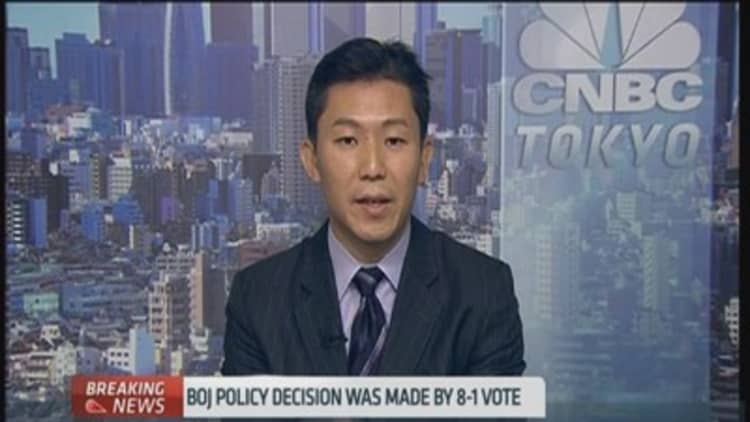
The Bank of Japan (BOJ) kept its monetary policy steady at its final meeting of the year on Friday, as had been expected, but raised its economic assessment, citing signs of a pickup in exports.
The economy is continuing its slow recovery from the dampening effects of a sales tax hike in April, with private consumption remaining resilient, the central bank said.
"I also share the BOJ's optimism about Japan's economy. As far as 12-18 months is concerned, it's blue skies all the way," Takuji Okubo, chief economist at Japan Macro Advisers, told CNBC.
"There are fiscal and monetary policy risks. There are some issues that need to be solved like exports are not growing, companies are not spending. These need to be solved, but I think it takes time," Okubo said. "Companies need time to change from a deflationary mindset to an inflation and better economic outlook mindset."
Read More Nikkei to go from 'ho-hum' to 'home run' in 2015
The board voted eight to one to keep monetary policy steady, with plans to buy around 80 trillion yen, or around $670 billion, worth of government bonds and other assets every year, in line with its Oct. 31 decision to increase its quantitative easing measures. The lone dissenter, Takahide Kiuchi, wanted to reverse the Oct. 31 decision to expand stimulus.
While the BOJ's decision likely signals no fresh stimulus is on the cards near term, some analysts have expressed concern that the recent sharp decline in oil prices may hamper the central bank's efforts to reach its inflation target of 2 percent. In October, Japan's core consumer price index, which strips out fresh food prices and the April sales tax hike, declined to 0.9 percent.
"The bank's view on inflation is too optimistic. The continued fall in oil prices will likely result in a further slowdown in price pressure in the near-term," Marcel Thieliant, an economist at Capital Economics, said in a note. "The upshot is that further monetary easing is still likely to be required, perhaps as early as April."
Markets generally took the decision in stride, with the index remaining solidly in the green after the decision, up around 1.9 percent. The yen weakened, with the U.S. dollar fetching 119.19 yen after the decision, compared with around 118.90 before the announcement.


